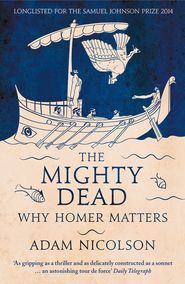
Полная версия:
The Mighty Dead: Why Homer Matters

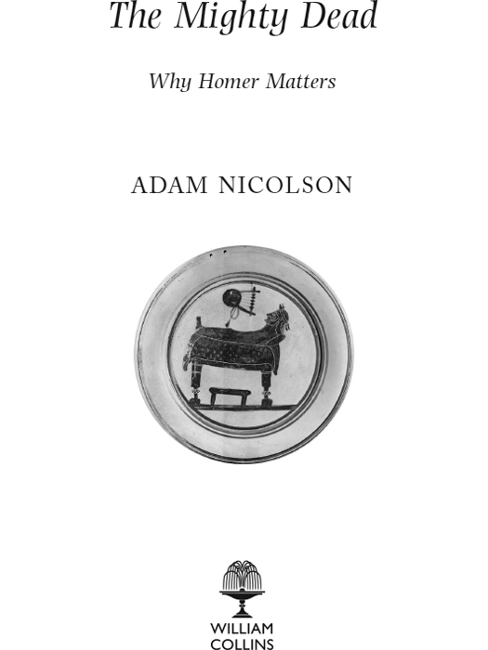
Copyright
William Collins
An imprint of HarperCollinsPublishers
1 London Bridge Street
London, SE1 9GF
WilliamCollinsBooks.com
Published by William Collins in 2014
Copyright © Adam Nicolson 2014
The Adam Nicolson asserts the moral right to be identified as the author of this work.
A catalogue record for this book is available from the British Library.
All rights reserved under International and Pan-American Copyright Conventions. By payment of the required fees, you have been granted the non-exclusive, non-transferable right to access and read the text of this e-book on screen. No part of this text may be reproduced, transmitted, down-loaded, decompiled, reverse engineered, or stored in or introduced into any information storage and retrieval system, in any form or by any means, whether electronic or mechanical, now known or hereinafter invented, without the express written permission of HarperCollins.
Source ISBN: 9780007335527
Ebook Edition © 2014 ISBN: 9780007335541
Version: 2016-04-15
Dedication
For
Sarah Raven
Thomas Nicolson
William Nicolson
Ben Nicolson
Rosie Nicolson
&
Molly Nicolson
Contents
Cover
Title Page
Copyright
Dedication
List of Illustrations
Maps:
The World of the Ancient Greeks
The Bronze Age World
Preface
1. Meeting Homer
2. Grasping Homer
3. Loving Homer
4. Seeking Homer
5. Finding Homer
6. Homer the Strange
7. Homer the Real
8. The Metal Hero
9. Homer on the Steppes
10. The Gang and the City
11. Homer’s Mirror
12. Homer’s Odyssey
Conclusion: The Bright Wake
Picture Section
Footnotes
Notes
Bibliography
Text Permissions
Index
Acknowledgements
By the same author
About the Publisher
List of Illustrations

COLOUR PLATES
1 ‘The Mask of Agamemnon’. (Universal History Archive/Getty Images)
2 Stamnos (vase) depicting Odysseus tied to the mast listening to the songs of the Sirens, c.480 BC, Athens. (Werner Forman/Universal Images Group/Getty Images)
3 Mycenaean funerary stele with relief chariot scene, c.1600 BC. (Photo by Adam Nicolson)
4 Mycenaean gold cup, sixteenth century BC. (National Archaeological Museum of Athens. DeAgostini/Getty Images)
5 Engraving depicting an octopus on a gold cup from Tholos of Dendra, near Midea, sixteenth century BC. (National Archaeological Museum of Athens. DeAgostini/Getty Images)
6 Mycenaean gold butterfly scales from the Shaft Graves, sixteenth century BC. (National Archaeological Museum of Athens. Photo by Adam Nicolson)
7 Attic terracotta lekythos (oil flask), attributed to the Achilles Painter, c.440 BC. (The Metropolitan Museum of Art. akg-images)
8 Mycenaean gold elliptical funeral diadem, from the ‘Grave of the Women’, sixteenth century BC. (National Archaeological Museum of Athens. Universal History Archive/UIG via Getty Images)
9 A gold death suit for a Mycenaean child, sixteenth century BC. (National Archaeological Museum of Athens. Photo by Adam Nicolson)
10 Damascened daggers made of gold, silver, bronze and niello, from Mycenae and Pylos. (DEA/G. DAGLI ORTI/De Agostini/Getty Images)
11 Writing tablet from the Ulu Burun wreck, c.1325 BC. (© Institute of Nautical Archaeology)
12 The tower of the Acropolis in Tiryns. (DeAgostini/Getty Images)
13 Nestor’s cup. (Museum of Ischia, Italy. © Maria Grazia Casella/Alamy)
14 Kantharos (drinking cup) depicting Odysseus and Nausicaa. (© The Trustees of the British Museum. All rights reserved)
15 Extremaduran warrior with shield, sword and mirror. (Museo Arqueológico Provincial de Badajoz. Photo by Adam Nicolson)
16 Stabbed Bronze Age phalera (horse harness ornament). (Wiltshire Museum. Photo by Adam Nicolson)
17 Extremaduran warriors with bow, spear, shield, swords, a bubble-handled mirror, what may be a musical instrument and large, man-slaughtering hands. (Museo Arqueológico Provincial de Badajoz. Photo by Adam Nicolson)
18 The Rio Odiel. (Photo by Adam Nicolson)
19 Silver gilt Cypriot bowl, c.725–675 BC. (© The Metropolitan Museum of Art/Art Resource/Scala, Florence)
20 Gold libation bowl, c.625 BC, found at Olympia, 1916. (Museum of Fine Arts, Boston. Photo by Adam Nicolson)
21 Minoan Kamares eggshell ware cup. (Heraklion Archaeological Museum, Crete. Leemage/UIG via Getty Images)
22 Ivory cosmetic case in the form of a duck. (© The Trustees of the British Museum. All rights reserved. Photo by Adam Nicolson)
23 David and Goliath by Michelangelo Merisi da Caravaggio (1571–1610), oil on canvas. (Museo del Prado. Photo by DeAgostini/Getty Images)
24 Mycenaean bronze dagger with an integral hilt and pommel, c.1300–1100 BC (© The Trustees of the British Museum. All rights reserved)
25 Wild pear tree, Ithaca. (Photo by Adam Nicolson)
26 Minoan bath, mid-fourteenth century BC. (© Carlos Collection of Ancient Art, Emory University)
27 Dionysus on a reach, surrounded by dolphins, 530 BC. (Staatliche Antikensammlung, Munich. Ann Ronan Pictures/Print Collector/Getty Images)
TEXT ILLUSTRATIONS
1 Terracotta plate depicting a poet on his death bed, musing on the past with his lyre above him, c.595–570 BC. (© The Metropolitan Museum of Art/Art Resource/Scala, Florence)
2 Mural from Palace of Nestor at Pylos. (Courtesy of the Department of Classics, University of Cincinnati)
3 Odysseus tied to the mast listening to the songs of the Sirens. (Werner Forman/Universal Images Group/Getty Images)
4 Rue Contrescarpe-Dauphine, c.1866, by Charles Marville. (Courtesy of Philippe Mellot)
5 Draft of Keats’s sonnet ‘On First Looking Into Chapman’s Homer’, October 1816. (Courtesy of the Houghton Library, Harvard University)
6 The title page of the 1788 Iliad edited by Villoison. (Courtesy of the Houghton Library, Harvard University)
7 Detail from the Hawara Homer manuscript (24–28. Bodleian Libr., Gr. Class. A.1 (P)). Homer, Iliad I, 506–10, Iliad II, 1–877, with many lacunae. Courtesy of the Centre for the Study of Ancient Documents; the Cairo Museum; the Association Internationale de Papyrologues and Dr Adam Bülow-Jacobsen)
8 Detail from p.111 of the Venetus A scholia. (Center for Hellenic Studies. © 2007, Biblioteca Nazionale Marciana, Venezie, Italia)
9 The megaron at Emporio, Chios. (Courtesy of John Boardman)
10 Ischian cratēr from ‘Pithekoussai’ by G. Buckner, Expedition Vol. 8, No. 4, summer 1966.
11 Nestor’s cup, eighth century BC. (Dbachmann)
12 Milman Parry. (Courtesy of the Milman Parry Collection of Oral Literature, Harvard University)
13 Bégan Lyútsa Nikshitch, photographed by Milman Parry. (Courtesy of the Milman Parry Collection of Oral Literature, Harvard University)
14 Bronze spearheads. (Museo Archeologico Paolo Orsi, Syracuse. Photo by Adam Nicolson)
15 Winnowing a harvest of wheat. (Getty Images)
16 The Uffington White Horse commands the site of a first-century BC Celtic fort, Uffington, Oxfordshire, England. (James P. Blair/National Geographic/Getty Images)
17 Back of a first-century BC gold Celtic stater of the Parisii or Quarisii (Paris region). (Dea Picture Library/De Agostini/Getty Images)
18 Sophia Schliemann, bedecked with diadem from Troy found by Heinrich Schliemann. (Time Life Pictures/Mansell/Time Life Pictures/Getty Images)
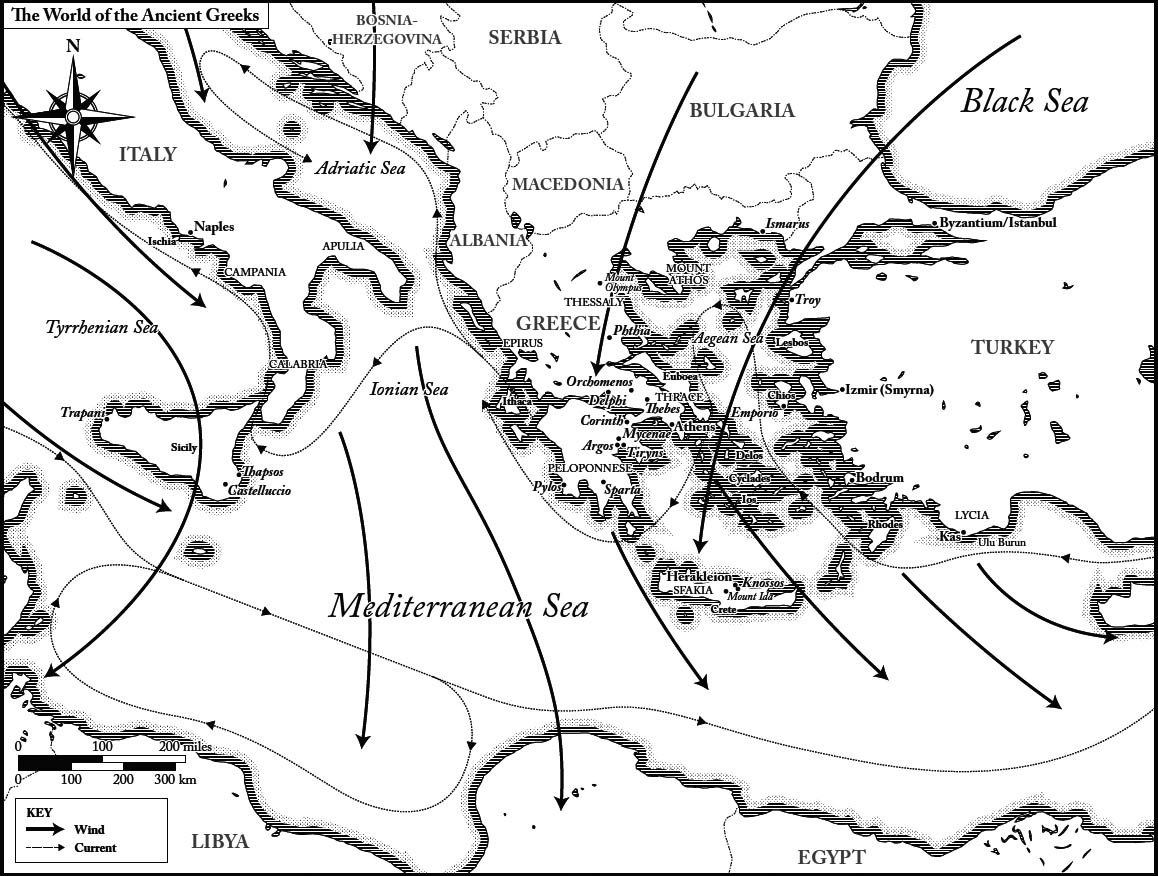
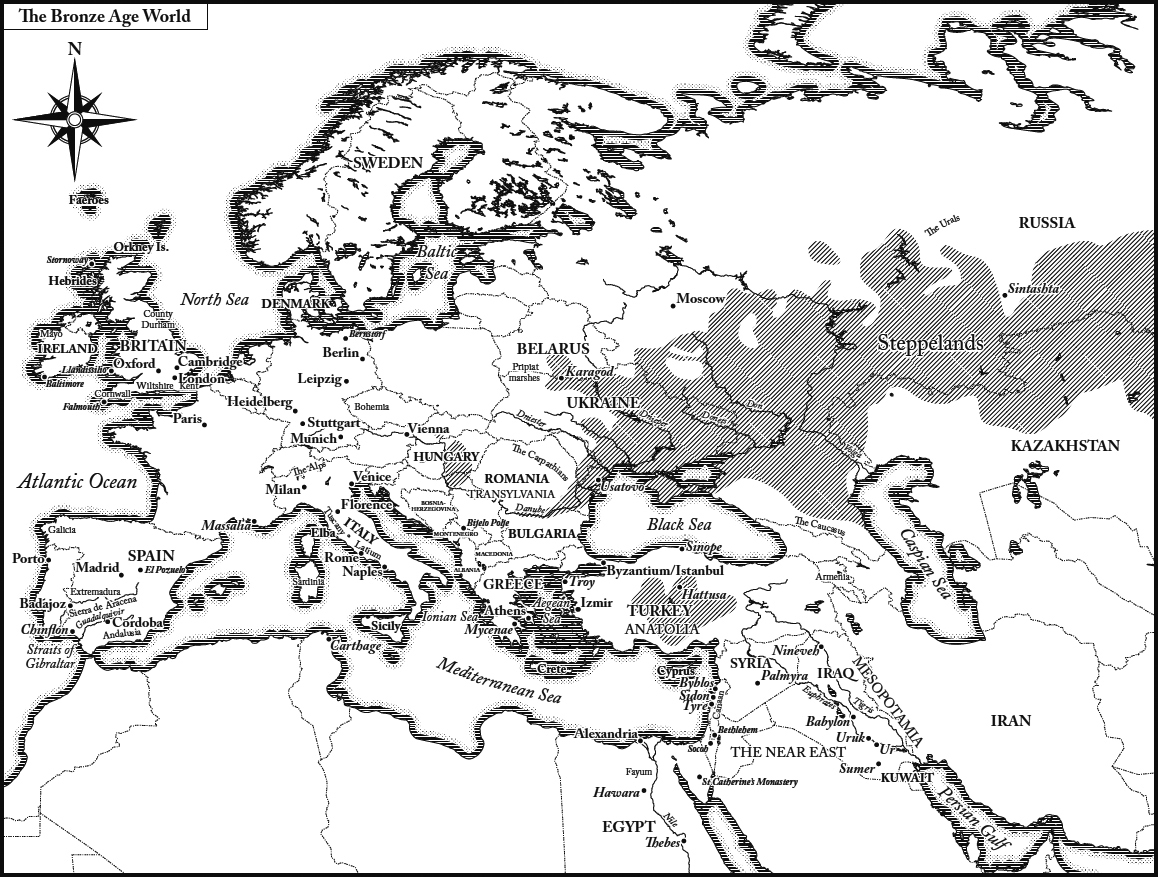
Preface

THERE IS A PAIR of linked questions at the heart of this book: where does Homer come from? And why does Homer matter? These ancient poems can be daunting and difficult, but I have no doubt that their account of war and suffering can still speak to us of the role of destiny in life, of cruelty, humanity, its frailty and the pains of existence. That they do is a mystery. Why is it that something conceived in the eastern Mediterranean Bronze Age, maybe four thousand years ago, as foreign as the Dayak, as distant as Vanuatu, can still exert its grip on us? How can we be so intimate with something so far away?
Perhaps it is a mistake to give the answer before the questions are properly asked, but this is complicated country, and an idea of the destination is worth having. Besides, it is a Homeric technique to tell the story before it begins. And so, if you ask why and how the Homeric poems emerged when they did, and why and how Homer can mean so much now, the answer to both questions is the same: because Homer tells us how we became who we are.
That is not the usual modern answer. The current orthodoxy is that the Iliad and the Odyssey are both products of the eighth century BC, or thereabouts, early Iron Age Greece, a time that has been called the Greek Renaissance. In the preceding half-millennium, Greek civilisation had largely sunk into isolated pockets of poverty. Many of the islands in the Aegean were deserted. One or two had remained rich and kept up links with the Near East, but the great palaces of an earlier Greece had fallen into ruin. But for reasons that have yet to be explained, the eighth century saw a widespread revival. The population of Greece and the islands began to grow. The tempo of life quickened. The art of making bronze, dependent on imported tin, was revived for the first time in four centuries. Colonies, trade, improved ships, gymnasiums, coinage, temples, cities, pan-Hellenic competitions at Olympia (the first, traditionally, in 776 BC), the art of writing, of depicting the human figure on pottery and in the round, the first written law codes, the dating of history, the first tentative moves towards the formation of city-states: every one of these aspects of a renewed civilisation quite suddenly appeared all over the eighth-century Aegean. Homer, in this view, was the product of a new, dynamic, politically inventive and culturally burgeoning moment in Greek history. Homer was the poet of a boom.
I see it differently: my Homer is a thousand years older. His power and poetry derive not from the situation of a few emergent states in the eighth-century Aegean, but from a far bigger and more fundamental historic moment, in the centuries around 2000 BC, when early Greek civilisation crystallised from the fusion of two very different worlds: the semi-nomadic, hero-based culture of the Eurasian steppes to the north and west of the Black Sea, and the sophisticated, authoritarian and literate cities and palaces of the eastern Mediterranean. Greekness – and eventually Europeanness – emerged from the meeting and melding of those worlds. Homer is the trace of that encounter – in war, despair and eventual reconciliation at Troy in the Iliad, in flexibility and mutual absorption in the Odyssey. Homer’s urgency comes from the pain associated with that clash of worlds and his immediacy from the eternal principles at stake: what matters more, the individual or the community, the city or the hero? What is life, something of everlasting value or a transient and hopeless irrelevance?
The idea I have pursued is that the Homeric poems are legends shaped around the arrival of a people – the people who through this very process would grow to be the Greeks – in what became their Mediterranean homeland. The poems are the myths of the origin of Greek consciousness, not as a perfect but as a complex, uneasy thing. As a civilisation, what emerged in Greece was distinct from both the northern steppelands of the Bronze Age and the autocratic bureaucracies of the Near East, and fused qualities of both. Homer is a foundation myth, not of man nor of the natural world, but of the way of thinking by which the Greeks defined themselves, the frame of mind which made them who they were, one which, in many ways, we have inherited. The troubled world described by Homer remains strangely familiar.
This is also a book about epic poetry, and the value of epic in our lives. Epic is not an act of memory, not merely the account of what people are able to recall, since human memory only lasts three generations: we know something of our grandparents, but almost nothing, emotionally, viscerally, of what happened in the generations before them. Nor is it a kind of history, an objective laying out of what occurred in a past to which we have little or no access. Epic, which was invented after memory and before history, occupies a third space in the human desire to connect the present to the past: it is the attempt to extend the qualities of memory over the reach of time embraced by history. Epic’s purpose is to make the distant past as immediate to us as our own lives, to make the great stories of long ago beautiful and painful now.
A wonderful depiction of epic itself survives from Mycenaean Greece. In the summer of 1939, the University of Cincinnati archaeologist Carl Blegen, along with a Greek team, began excavating the Mycenaean palace of Pylos, in the south-western Peloponnese. In the great columned room at the centre of the palace, Blegen discovered, in pieces on the floor, where it had been dumped by the fire which brought the Mycenaean world to an end around 1200 BC, a revelatory fresco.
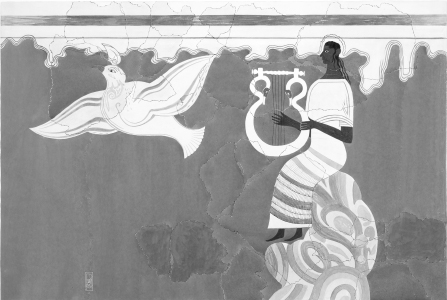
Against a ragged background, perhaps a rough, mountainous horizon, a poet – call him Homer – sits on a luminous, polychromed rock, a nightclub idea of a rock, dressed in a long striped robe with the sleeves of his overshirt coming almost halfway down his bare brown arms. His hair is braided, tendrils of it running down his neck and on to his back. He looks washed. Everything about him is alert, his eye bright and open, his body poised and taut, upright, ready. In his arms he holds a large five-stringed lyre, the fingers of his right hand plucking at those strings, which bend to his touch.
Against the florid red of the wall behind him – the colour of living, not dried blood, the red of life – is the most astonishing part of this image: an enormous, pale bird, the colour of the bard’s robe, the feathers of its wings half-delineated in the red that surrounds it, its eye as bright and open as Homer’s, its body larger than his, its presence in the room huge and buoyant, nothing insubstantial about it, making its way out into the world, leaving Homer’s own static, singing figure behind.
The bird is poetry itself taking wing, so big, so much stronger than little Homer with his hairdo and his fingers on the lyre. It is the bird of eloquence, the ‘winged words’, epea pteroenta, which the Homeric heroes speak to each other, epea having the same root as ‘epic’, pteroenta meaning ‘feathered’: light, mobile, airy, communicative. Meaning and beauty take flight from Homer’s song.
It is one of the most extraordinary visualisations of poetry ever created, its life entirely self-sufficient as it makes its way out across that ragged horizon. There is nothing whimsical or misty about it: it has an undeniable other reality in flight in the room. There is a deep paradox here, one that is central to the whole experience of Homer’s epics. Nothing is more insubstantial than poetry. It has no body, and yet it persists with its subtleties whole and its sense of the reality of the human heart uneroded while the palace of which this fresco was a part lies under the thick layer of ash from its burning in 1200 BC. Nothing with less substance than epic, nothing more lasting. Homer, in a miracle of transmission from one end of human civilisation to the other, continues to be as alive as anything that has ever lived.
Homer is no wild, gothic figure. He is shown supremely controlled, as organised and calmly present as anything in this civilised place, with its great store rooms, its archive centre and its beautifully dressed and fragrant inhabitants. He is civility itself. By the time this fresco was painted, the Greeks had been able to write for about 250 years, running sophisticated palace-based economies, with record-keeping bureaucracies to organise tax and military service, and to administer complex commercial and quasi-imperial relations across the eastern Mediterranean.
If that is the world in which Homer sang, it is not the world he sang about, which was much older, rougher, more elemental. He sang of the past which the occupants of this palace had left behind. That time gap allows one to see the Homeric poems as I think they should be seen: as the violence and sense of strangeness of about 1800 BC recollected in the tranquillity of about 1300 BC, preserved through the Greek Dark Ages, and written down (if not in a final form) in about 700 BC. Homer reeks of long use. His wisdom, his presiding, god-like presence over the tales he tells, is the product of deep retrospect, not immediate reportage. His poetry embodies the air of incorporated time, as rounded as something that for centuries has rolled back and forth on the stony beaches of Greece. But it is also driven by the demands of grief, a clamouring and desperate anxiety about the nature of existence and the pains of mortality. This is the story of beginnings, and that feeling for trouble is the engine at the heart of it.
This book will make its way back towards that fresco, looking for Homer anywhere he might be found, in my own and many others’ reactions to the poems, in life experiences, in archaeology and in the landscapes where the Homeric ghosts can still be heard. It is a passionate pursuit, because these epics are a description, through a particular set of lenses, of what it is like to be alive on earth, its griefs, triumphs, sufferings and glories. These are poems that address life’s moments of revelation. Here you will find ‘the neon edges of the sea’, as Christopher Logue described the waves on the Trojan beach; the horror of existence, where ‘Warm’d in the brain the smoking weapon lies’, as Pope translated one murder in the Iliad; and its transfixing strangeness – the corona-light in the scarcely opened helmet slits of Achilles’s owl-like eyes, which Logue saw burning ‘like furnace doors ajar’.
In all the walking and thinking this book has given me, no moment remains more lasting in my mind than an evening on a small rocky peninsula near Tolo on the south-eastern coast of the Peloponnese. I had been thinking about George Seferis, the Greek poet and diplomat who won the Nobel Prize in 1963, and who had come here before the Second World War, when archaeologists were discovering that this little stony protuberance into the Aegean was the acropolis of Asinē, a place entirely forgotten, except that it had survived in the Iliad as a name, one of the cities from which Greek warriors had set out for the siege at Troy.
The sea in the bay that evening was a mild milk-grey. The puttering of the little diesel-driven fans that keep the air moving through the orchards on a frosty night came from the orange groves inland. The sky promised rain. Sitting by the sea squills and the dry grasses blowing in the wind off the Gulf of Argolis, I read what Seferis had said about our relationship to the past. ‘The poem is everywhere,’ he wrote. Our own imaginative life
sometimes travels beside it
Like a dolphin keeping company for a while
With a golden sloop in the sunlight,
then vanishing again.
That glowing, if passing, connection is also what this book is about, the moment when the dolphin is alongside you, unsummoned and as transient, as Seferis also said,
As the wings of the wind moved by the wind.
ONE
Meeting Homer

ONE EVENING TEN YEARS ago I started to read Homer in English. With an old friend, George Fairhurst, I had just sailed from Falmouth to Baltimore in south-west Ireland, 250 miles across the Celtic Sea. We had set off three days earlier in our wooden ketch, the Auk, forty-two feet from stem to stern, a vessel which had felt big enough in Falmouth, not so big out in the Atlantic.
It had been a ruinous journey. A mile or so out from the shelter of Falmouth we realised our instruments were broken, but we had been preparing for too long, were hungry to go, and neither of us felt like turning back. A big storm came through that night, Force 8 gusting 9 to 10, west of Scilly, and we sailed by the stars when it was clear, by the compass in the storm, four hours on, four hours off, for that night, the next day and the following night. The seas at times had been huge, the whole of the bow plunging into them, burying the bowsprit up to its socket, solid water coming over the foredeck and driving back towards the wheel, so that the side-decks were like mill-sluices, running with the Atlantic.
After forty hours we arrived. George’s face looked as if he had been in a fight, flushed and bruised, his eyes sunk and hollow in it. We dropped anchor in the middle of Baltimore harbour, its still water reflecting the quayside lights, only our small wake disturbing them, and I slept for sixteen hours straight. Now, the following evening, I was lying in my bunk, the Auk tied up alongside the Irish quay, with the Odyssey, translated by the great American poet-scholar Robert Fagles, in my hand.
I had never understood Homer as a boy. At school it was taught to us in Greek, as if the poems were written in maths. The master drew the symbols on the green blackboard and we ferreted out the sense line by line, picking bones from fish. The archaic nature of Homer’s vocabulary, the pattern of long and short syllables in the verse, the remote and uninteresting nature of the gods, like someone else’s lunchtime account of a dream from the night before: what was that to any of us? Where was the life in it? How could this remoteness compare to the urgent realities of our own lives, our own lusts and anxieties?



